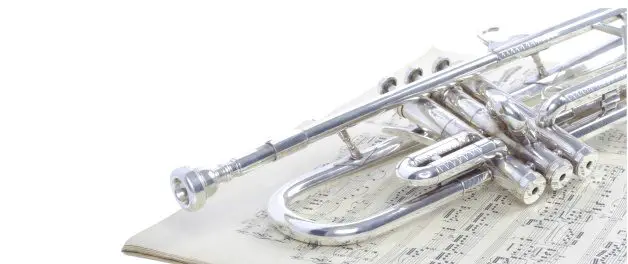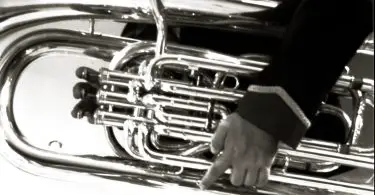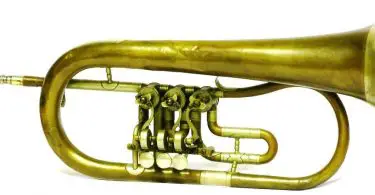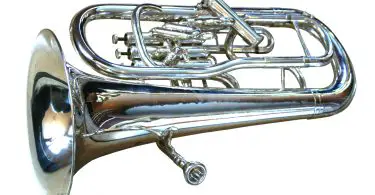Instruments are easier to use and sound better when properly cared for. We’ve put together an all-inclusive guide to cleaning and caring for brass instruments. The following products and maintenance suggestions will allow you to enjoy your instrument to its fullest potential and eliminate costly, time-consuming repairs down the road.
Our testing has given us a first-hand look at caring for brass instruments and led us to choose Blue Juice Valve Oil for our top pick.
Top Pick: Blue Juice Valve Oil
Buy from AmazonBlue Juice is our pick for a superior valve oil for several reasons. Most notably because it efficiently lubricates and unsticks valves. And as an added bonus, it didn’t stink while we played.
I spent several hours researching and personally testing popular brass instrument cleaning products. While cleaning and caring for a brass instrument is a fairly simple process, we’ve discovered that a superior product and bit of background knowledge can drastically improve an instrument’s potential.
My husband is an amateur trumpeter who has always struggled with keeping his instrument in workable condition. After narrowing down several products based on their popularity and consumer feedback, I put them to the test on his rusty but well-loved brass. While I cannot say that every product lived up to its promise, after several trial cleaning sessions, his trumpet now looks and sounds like an entirely different instrument. I am confident that the following guide will give you similar results.
The Importance of Cleaning and Caring for Your Instrument
Any object that is continually subjected to oral bacteria and spit should be cleaned diligently and often. While a brass instrument’s intricate valves, slides, and piping are responsible for its distinct and charming sound, they also provide the perfect environment to harbor bacteria and dirt.
By taking a few minor precautions and sticking to a simple, yet effective cleaning routine, you can assure yourself that your instrument will sound better and be safer to use. The following guide provides a basic framework for cleaning and maintaining your instrument.
How to Choose your Cleaning Products
To get you started, we’ve compiled a list of the basic elements of a brass instrument cleaning kit. While several manufacturers offer such kits, we strongly recommend you take the time to put together your own. Premade kits tend to consist of generic or inferior products and are not always economical. By building your own, you will be able to select from a far greater variety of products.
Valve Oil
It is no coincidence that our top product happens to be a valve oil. For a product that is fairly inexpensive and easily accessible, valve oil can influence a player’s speed, endurance, and overall performance. A brass instrument’s slides and valves depend on lubrication to get optimal tones.
So, how do you choose between one tiny bottle and another? For starters, differentiate between synthetic and petroleum-based brands.
We spoke with several brass musicians and found that opinions on the two varied greatly. Some players said that petroleum-based oils evaporated quicker and sometimes left a gunky residue. However, many other musicians stated that consistent applications alleviate this problem altogether. Other musicians claimed that the thinner petroleum-based products made for better performance.
Make an informed decision. There is no right or wrong choice, but combining various oils may result in hard-to-remove build-up.
Valve Brush
A good quality valve brush consists of somewhat abrasive nylon bristles and a flexible metal core. The brush should fit snuggly into an instrument’s valves and valve casings to aid in the removal of grit.
All the valve oil in the world won’t help unstick valves in need of a deep cleaning. Don’t fret, you only need to commit to this task once or twice a month.
Slide Grease
Slide grease is necessary to lubricate an instrument’s slide each time you play it. The slide is the U-shaped piece of a brass instrument that connects two parallel tubes.
The slide on a trombone can be used to alter the length of the tube and, therefore, generate varying notes. Brass instruments also consist of tuning slides, which can be adjusted to match the pitch of a band.
A slide should glide smoothly at all times. If it doesn’t, this is a good sign the instrument needs a good greasing. A common misconception regarding slide grease is that it can be supplemented with valve oil, vaseline, or even spit. This should be avoided as none of these render the lengthy lubrication that a slide grease can.
What’s more, acidic spit can prematurely corrode the slide.
Cleaning Snake
Cleaning snakes are long, flexible rods that are made to maneuver through the narrow, twisting tubes of a brass instrument. While musicians have been known to make their own snakes, buying one is preferable and inexpensive.
Better yet, a well-made snake usually has a soft plastic or rubber coating that prevents the metal cord from scratching the interior of an instrument. Avoid snakes made from brittle materials or with several poor reviews. These tools pose a risk of getting lodged inside of an instrument.
Mouthpiece Brush
A mouthpiece brush should be used at least once a week. Most brushes are small, cone-shaped, and consist of plastic bristles attached to a wound metal core. Brushes only cost a few dollars and can be used repeatedly to clean and sanitize a brass instrument mouthpiece.
While it may seem just as easy to supplement a mouthpiece brush with your valve brush, we highly frown upon this. Your mouthpiece and any material used to clean it should be kept from cross contamination.
Maintenance Tips & Tricks
Our top maintenance tip is the brass instrument bath. For a complete tutorial, check out “Making Music Magazine’s” YouTube video.
“Best Way to Clean a Trumpet”
These tips can be used for any type of brass instrument. You may just need a larger basin when bathing larger instruments. The process is fairly simple. All it requires is submerging the instrument it in warm, soapy water and giving it a good scrub.
It is best to use an efficient dish soap and a microfiber or cotton cloth to scrub the instrument inside and out. The bath water should also be dispersed throughout the instrument’s tubes and valves several times.
Finally, the entire instrument should be rinsed with warm, soap-free water.
Once you are finished, remove the instrument from the bath and allow it to dry completely. Don’t concern yourself with wicking moisture deep within the instrument’s bore. Playing the instrument will naturally push this moisture out.
Always remember, a bath will remove built-up and free up residue that can get stuck in a brass instrument’s complicated hollow structure, but it isn’t going to make up for months of neglect.
You can minimize the need for frequent baths by taking a few preventative actions. First, avoid playing your instrument after eating or drinking.
Even better, brush your teeth to eliminate spreading potentially corrosive food debris. While a metal instrument is incredibly strong, it is certainly not immune to corrosion.
Common Pitfalls
Brass instruments are durable enough to be passed on from one player to another, to be resold, refurbished, and pushed to the limit. That being said, they are not without their weaknesses.
Sugar, for example, can cause valves to stick. Even spit and sweat, which are to be expected, can cause significant corrosion.
While you can’t avoid adverse elements altogether, set yourself up for success by committing to a normal maintenance schedule.
Stuck Valves
Stuck or frozen valves are all too common considering how easy it is to avoid them. In most cases, stuck valves can be avoided by maintaining and cleaning your valves often. This means applying valve oil as needed and removing gunk before it starts to do damage (Criswell).
A sure sign that your valves are headed in the wrong direction is when they start to stick or release slowly. Another cause for stuck valves is misaligned valves. This often occurs when a musician takes apart their instrument for cleaning or maintenance it and fails to properly pair valves within their valve casings.
If you’ve done this, carefully remove the misaligned valves and place them in them in the proper casings. If they won’t budge, it is best to bring your instrument to a professional. Attempting to shake or knock free a valve can be severely damaging to a brass instrument.
Homemade Cleaning Devices
It takes ingenuity to create your own cleaning supplies, but sometimes it is wiser to invest in manufactured products. We’ve heard horror stories about cloth and cleaning snakes getting lodged inside an instrument’s bore minutes before a performance and just cannot justify the risk.
Nearly every product on our recommendation list can be purchased for under $10. While it may be a bit of an initial investment to build your brass instrument maintenance kit, we highly recommend doing so if you want a good sounding, reliable instrument.
On that note, avoid supplementing valve grease or oil for household lubricants. Combining chemicals can deteriorate your instrument and leave messy build-up behind.
Sanitation
Cleaning your brass instrument isn’t all about instrument longevity and sound. Instruments can act as Petri dishes for harmful bacteria. You’ll be doing a service to your health by taking the time clean and sanitize your mouthpiece to avoid transmitting bacteria directly into your airways.
This can be done with soap and water or by wiping it down with a moist alcohol pad. Be sure to allow the alcohol to dry before giving your instrument a blow.
We also recommend that you avoid sharing your instrument whenever possible.
Acid Wash
We don’t recommend trying this cleaning method at home, but an annual acid wash is a great way to preserve your instrument. A full-service chemical bath will flush your instrument of pesky build-up and allow your valves and slides to move more freely.
Shops will return your instrument to you fully oiled and greased. If you are a student, it is best to request this service during the summer.
There is no excuse for neglecting your instrument, but a chemical bath will rejuvenate even the most abandoned instruments.
The Competition
After hours of testing and research, here's the final competition.
| Instrument | Rating | Current Pricing |
|---|---|---|
Blue Juice Valve Oila | Top Pick |  |
Al Cass Valve Oil | Runner Up |  |
Denis Wick Valve Brush | The nylon bristles are close enough together that you will be able to quickly and efficiently clean out the valves of any brass instrument. |  |
Players Products Trumpet Snake | Features multicolor nylon bristle ends |  |
Yamaha Trombone Slide Oil | Lubricates a slide without leaving a residue |  |
Yamaha Trombone Slide Oil | The set includes two layers of microfiber cloth |  |
Original Monster Oil | The same lubricant NASA employs for their outer space ventures |  |
Monster Oil "Grease" | The synthetic recipe doesn't evaporate quite as fast as petroleum based lubes. |  |
Venture 205 Tuning Slide Grease Tube | Mess-free |  |
Herco HE185 Spitballs | Instantly clean the tubes and bore |  |
Gerlitz SMUDGEOFF Smudge Off Spray Cleaner | Removes smudges and leaves a shiny metal surface |  |
Our Top Pick: Blue Juice Valve Oil
After combing through countless brass instrument cleaning products, we’ve decided that no musician should be without a superior valve oil. Based on customer reviews and first-hand testing, we recommend Blue Juice Valve Oil because of its ability to efficiently lubricate and unstick valves. A 2.4-ounce bottle costs about the same as a Subway sandwich and will provide you with several applications.

Credit: Amazon.com
For a petroleum-based valve oil, Blue juice is very light and provides long-lasting coverage. Blue juice is highly refined and doesn’t leave behind residue. Even synthetic oil diehards will appreciate the capabilities of this unique blue product. While users may find themselves applying it more frequently, we feel that its superior ability to keep your instrument running smoothly is worth the extra time and effort. As an added bonus, we found the slight petroleum smell to be very tolerable and unnoticeable during play.
Unlike most valve oils on the market, Blue Juice adds a unique anti-corrosion component to their product. While we didn’t use this product long enough to conclude whether or not this claim is correct, we were grateful for the potential added protection.
After speaking with several longtime users of Blue Juice, we were reassured that this product is reliable for long time use. Unlike many synthetics, users didn’t experience any build-up in their valves after repeat usage.
Runner Up: Al Cass Valve Oil

Credit: Amazon.com
Al Cass Valve Oil is a great alternative to Blue Juice. In fact, the two products seem to be equally revered by both professional and amateur musicians. Unlike other oils, Al Cass does not have an odor and it never gums up.
On the downside, the packaging is flimsy. While we didn’t have any personal mishaps when testing it out, our concern for leaks or spills has slightly reduced our rating for this product.
Other Products to Consider:
Denis Wick Valve Brush

Credit: Amazon.com
No brass instrument player should be without a decent valve brush. The Denis Wick DW4918 Valve Brush is a great option and is currently priced at
The nylon bristles are close enough together that you will be able to quickly and efficiently clean out the valves of any brass instrument. And they are soft enough that they will not scratch or damage your instrument in any way.
Players Products Trumpet Snake

Credit: Amazon.com
Players offers up an economical line of brass instrument cleaning snakes. The snakes are basic, with a rubber-coated metal line that features multicolor nylon bristle ends. We appreciate the strong rubber coating because it reduces the risk of interior scratches. We were also pleased with this product’s strength.
While other snakes had a tendency to unscrew or get lodged in our trumpet’s tubes, the Players snake did not. Current Amazon.com price: 
Yamaha Trombone Slide Oil

Credit: Yamaha Corporation
For trombone players, Yamaha makes a high-quality synthetic oil. This product lubricates a slide without leaving a residue. A 1.6-ounce bottle is currently priced at 
While many trombonists choose to use a grease instead of an oil, we found this product to work faster and more efficiently.
Leblanc Soft Metal Polishing Cloth Set

Credit: Amazon.com
While this cleaning accessory isn’t essential, we love that it was able to completely transform our tarnished trumpet. The set includes two layers of microfiber cloth. The top layer is excellent for wiping down the outer surface of the instrument.
The smaller pink cloth fits nicely into an instrument’s crevices for an optimal internal wipe down. After wiping our instrument down it appeared shiny and scuff-free. The set is currently 
Original Monster Oil

Credit: Amazon.com
Our list wouldn’t be complete without including our favorite synthetic valve oil. We chose Monster Oil because it is an extremely clean synthetic and it hardly requires reapplication. According to the company, this is the same lubricant NASA employs for their outer space ventures.
While we don’t even begin to expect the same level of dependability from a inexpensive bottle of valve oil (Current Amazon.com price: 
Monster Oil “Grease”

Credit: Amazon.com
If you’ve begun to appreciate Monster as much as we have, you’ll be happy to discover the company also manufactures a synthetic tuning slide grease. Be warned, the synthetic recipe doesn’t evaporate quite as fast as petroleum based lubes.
So you’ll probably want to cut down on how frequently and liberally you apply it. If you’ve found you have over applied the grease, simply take a rag and wipe off the excess.
Venture 205 Tuning Slide Grease Tube

Credit: Amazon.com
While there are several great tuning greases on the market, these products can be extremely messy. After sticking our hands into several of these greasy lubes, we were greatly relieved to come across this handy, compact tube of grease. While the viscosity isn’t quite as great as Monster’s, Venture grease works well and is mess-free.
If you are a student or someone who doesn’t want to leave every practice session covered in grease, we highly recommend this product. It currently sells for 
Herco HE185 Spitballs

Credit: Amazon.com
Spitballs are the secret weapon of brass instrument cleaning. When we first discovered this small jar of instrument cleaning sponges, we weren’t sure what to expect. For 
While it sounds too good to be true, we were satisfied to find that it wasn’t! We tried this out on our instrument the sponge ejected rapidly from the instrument with quite a few ugly remnants. While we don’t suggest you ditch your cleaning routine for this product, it will allow you to go a few more days in between bathing your instrument. Plus, it is sort of fun!
Gerlitz SMUDGEOFF Smudge Off Spray Cleaner

Credit: Amazon.com
We cannot stress enough that cleaning the mouthpiece, tubes, slides, and valves of your instrument are imperative. And once you’ve started truly caring for your brass, you’ll discover a desire to improve its overall appearance.
After all, there is nothing like the shine and luster of a well-cared-for instrument. Gerlitz Smudge Spray removes smudges and leaves a shiny metal surface that is to be envied. If you are looking to build the most economical maintenance kit possible, go without this product. But this spray sure does make your brass look pretty!
Do it Yourself With Dish Washing Detergent
Here’s one interesting option I have not yet tried myself. Hat tip to a sousaphone player (for the last 24 years) in a trad Jazz band in Melbourne. For 20 years, he’s found this to be a superior valve lubricant and claims it is truly MAGIC. And it is definitely cheap as well.
What you can do is take a squirt bottle, and fill it 7/8 or so full with water. Then top it off with plain old dishwashing DETERGENT! The detergent has great lubricating properties and the water/detergent combination both lubricates and cleans the valves at the same time. Try it out!
Sources
- Criswell, C. (2015, November 28). Stuck, leaking, and clogged trumpet valves and how to fix them. Retrieved January 17, 2017, from https://www.musicedmagic.com/playing-an-instrument/stuck-leaking-and-clogged-trumpet-valves-and-how-to-fix-them.html
- Making Music magazine (2013, May 2). Best way to clean a trumpet Retrieved from https://www.youtube.com/watch?v=EBPntaUJLFI
- Music for kids: How brass instruments work. Retrieved January 16, 2017, from http://www.ducksters.com/musicforkids/how_brass_instruments_work.php
- Tuning and Valve Slides. Retrieved January 17, 2017, from http://fac.hsu.edu/bucknej/resources/trumpet%20talk/tuning_and_valve_slides.htm
- VALVE OIL….THE MORE YOU KNOW. (n.d.). Retrieved January 16, 2017, from http://www.nemc.com/resources/articles/valve-oil-the-more-you-kno_54








Start the discussion at talk.hearthemusicplay.com